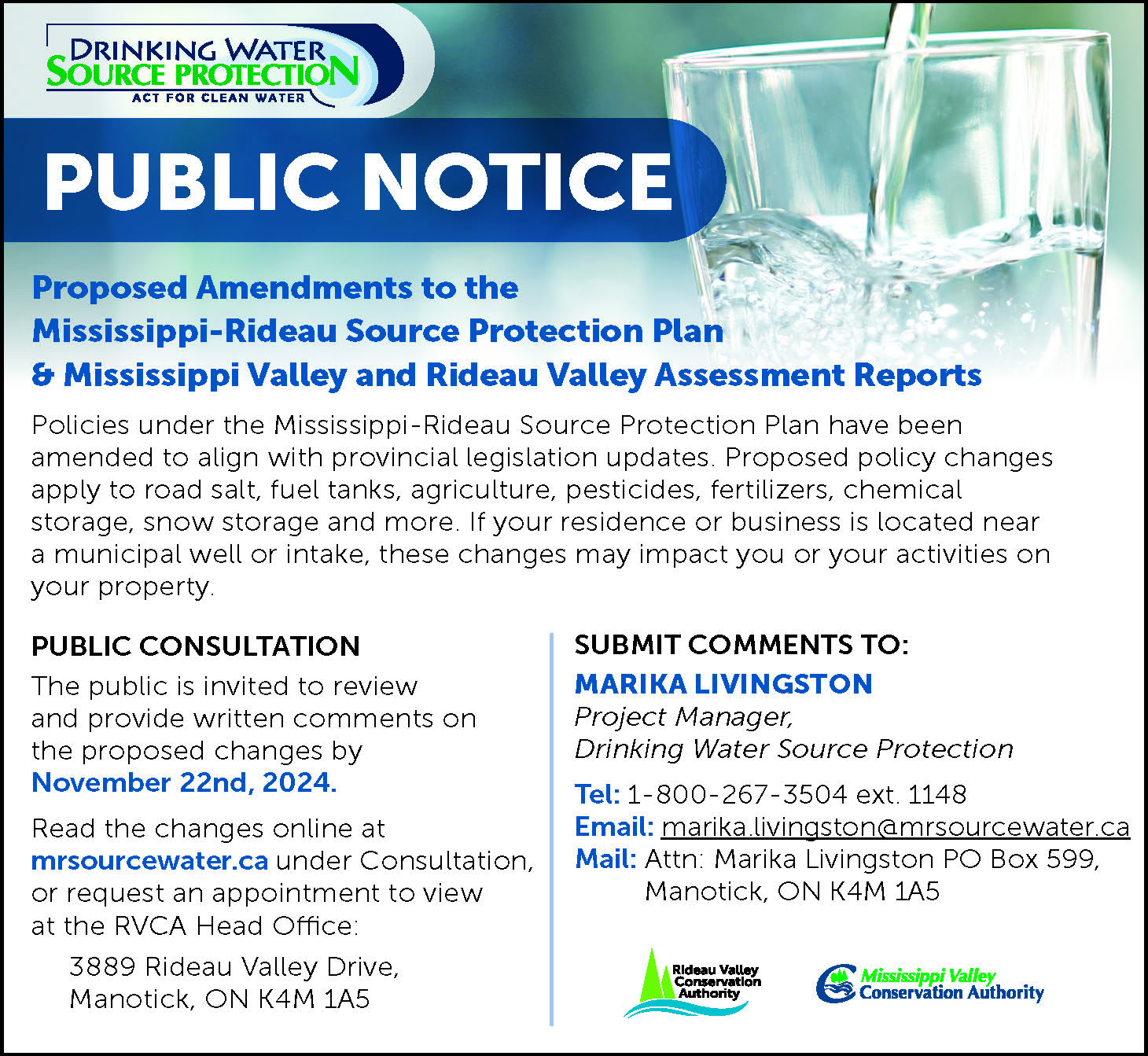 Public consultation is now open for several policy amendments to the Mississippi-Rideau Source Protection Plan. Proposed policy changes apply to the management of road salt, fuel tanks, agriculture, pesticides, fertilizers, chemical storage, snow storage and other potential drinking water threats near municipal wells or intakes.
Public consultation is now open for several policy amendments to the Mississippi-Rideau Source Protection Plan. Proposed policy changes apply to the management of road salt, fuel tanks, agriculture, pesticides, fertilizers, chemical storage, snow storage and other potential drinking water threats near municipal wells or intakes.
The Mississippi-Rideau Source Protection Plan is a locally developed plan to keep our municipal drinking water safe and clean. It is required under the Clean Water Act, 2006.
This Plan is overseen by the Mississippi-Rideau Source Protection Region and has been in effect since 2015. This plan contains policies for activities that have been determined to be significant drinking water threats (as determined by the Technical Rules under the Clean Water Act, 2006) in areas near municipal groundwater wells and surface water intakes. It is currently undergoing an update to align with recent legislative changes from the Ministry of Environment, Conservation and Parks. Proposed updates include changes to how threats are managed on properties near municipal wells and intakes, such as implementing new storage methods, improving spill preparedness, or, in some cases, requiring a risk management plan. The updates will only apply to a select number of properties located within designated drinking water protection zones.
Drinking water sources in the Mississippi-Rideau Source Protection Region include groundwater, drawn from aquifers underground, and water drawn from the Ottawa River, Rideau River, Tay River and Mississippi River. The Source Protection Plan sets out policies that use a variety of tools to protect municipal drinking water sources from contamination. These tools include education, risk management planning, prohibition and land use planning. Visit the Source Protection Region’s local website at https://www.mrsourcewater.ca to find out more.
The Source Protection Region is required to consult with the public on the proposed changes. Revisions can be viewed using the link below
Proposed changes to MRSPR Assessment Report and Source Protection Plan
A summary of updates can be found below
Hard copies can be viewed by appointment at the Rideau Valley Conservation Authority headquarters in Manotick. Members of the public can provide feedback on the proposed changes until November 22, 2024.
If you have questions or wish to provide comments about the proposed changes, please contact Marika Livingston at 613-692-3571 ext. 1148 or This email address is being protected from spambots. You need JavaScript enabled to view it..
Developed by groundwater and public health experts at the local Spring Ridge Training Institute, the following engaging videos explore - with increasing detail - threats to highly vulnerable aquifers and how we can address them.
Video 1: Highly Vulnerable Aquifers: An Introduction
A brief introduction to the concept of aquifers, how they can become contaminated, and how residents, businesses and governments can do their part to protect them.
Video 2: Highly Vulnerable Aquifers: Geology, Policy and Protection
A closer look at the hydrogeology behind contamination risks and how policy at local and regional levels can impact their protection.
Video 3: HVAs: A Summary of Current Research on Highly Vulnerable Aquifers
A deep-dive into the current scientific research about HVA hydrogeology.
Mississippi-Rideau Source Protection Region
Rideau Valley Conservation Authority Office
3889 Rideau Valley Drive
P.O. Box 599
Manotick, ON K4M 1A5